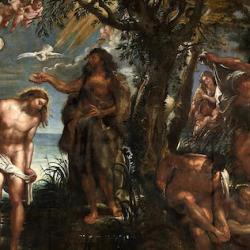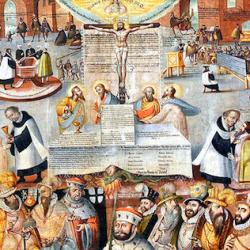In his contribution to The Catholicity of the Reformation, Robert Jenson pencils in the contours of the communio ecclesiology that arose within Orthodoxy and Roman Catholicism and has become, as he says, “a major achievement of ecumenical consensus” (1).
It is a Trinitarian ecclesiology and, in Jenson’s summary, an eschatological one. As people of God, body of Christ, and temple of the Spirit, the church is “grounded in God himself,” but grounded in anticipation, since the people are gathered only at the end, the body will be perfected at Christ’s return, and the Spirit is present as down payment (2-3).
Theosis is “the most precise and compendious possible evocation of the end for which God creates us.” Though the Creator-creature distinction is “absolute and eternal,” since God is infinite “there can be no limit to the modes and degrees of creatures’ promised participation in his life.” Jenson thinks life is just the right term: “our end is not participation in an abstract essence of Godhead, but in the life that Father, Son, and Spirit have among themselves” (3).
The church is a communio in the life of the Triune God in Christ that anticipates the communio of the end. Because we have fellowship with God in Christ, and because the triune God’s “very being is koinonia,” therefore our participation in God “becomes out participation in one another” (5).
At this point, the theology of baptism writes itself: “It is baptism that creates the community of the church, with its shared blessings, and brings each of us into that community. The church is the community of the justified and sanctified; thus baptism’s work is described in the New Testament as justification and sanctification (1 Cor. 6:11). The church is a priestly and prophetic community; in the New Testament, baptism is invoked as the anointing by which priests and prophets are made (Heb. 10:22; 1 John 2:20). The church is persecuted but victorious; according to the New Testament, baptism ‘saves’ (1 Pet. 1:3-21). And this same baptism is foundationally initiation into the fellowship of Christ’s disciples and just so into God triunity” (5).














